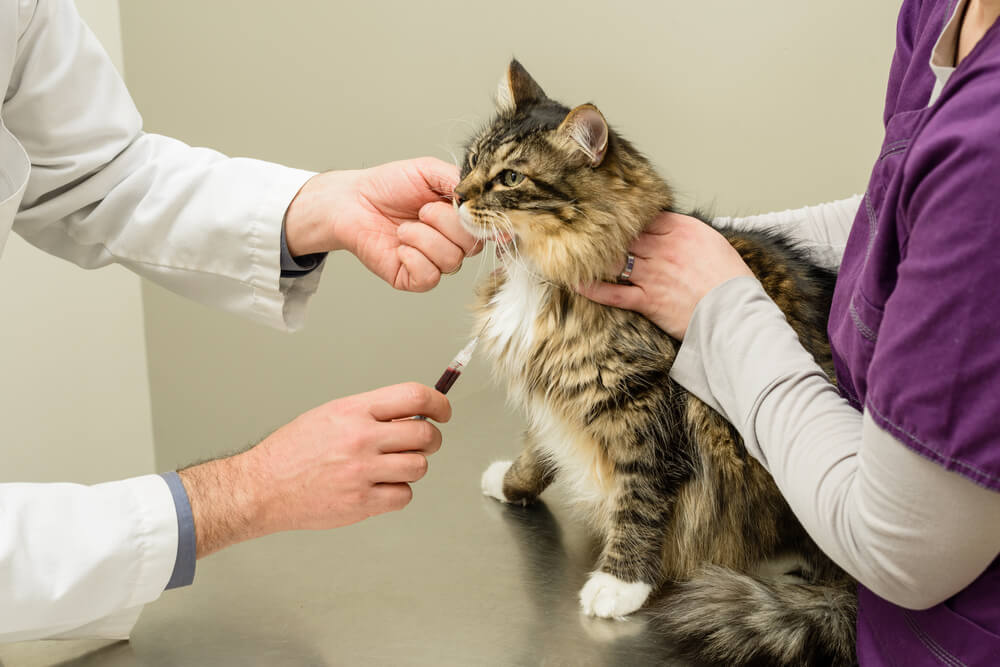When taking your pet to Holland Lake Animal Hospital for annual wellness visits, do you think about only your dog? Don’t forget your feline friend also needs routine veterinary care to remain happy and healthy. According to an American Veterinary Medical Association (AVMA) pet ownership survey, 79% of pet owners took their dog—but only 48% took their cat—to the veterinarian for routine or preventive care in 2016. An incredible 39% of cat owners take their cat to the veterinarian only when they are injured or ill. Although convincing your kitty the carrier is a safe place may not be easy, transporting your cat to our veterinarians is essential for evaluating their health, detecting hidden disease, providing treatment, and preventing future issues.
Why aren’t cats taken to the veterinarian as often as dogs?
Since veterinary care is so important to your cat’s health, why aren’t cats taken to their veterinarians as often as dogs? Let’s find out.
- Routine wellness care may not be budgeted — Some people may believe preventive veterinary care is an unnecessary expense, and prefer to get help only when their pet is ill or injured, yet routine wellness care can save money in the long run. By investing in preventive care for your cat, you can ward off many potentially life-threatening—and costly—diseases.
- Cats appear healthy and normal — One of the top reasons people do not take their cat to the veterinarian is because they don’t notice any problems. However, cats are pros at hiding illness and injury, and may be silently suffering without veterinary care.
- Vaccinations are not due — As more vaccinations provide three-year protection, pet owners may not take their cat for an annual wellness exam if no vaccines are due that year.
- Transportation is tedious — Cats are homebodies, and prefer to stay in familiar territory, so convincing them that their carrier is a safe place can be a struggle. Many cats fail to receive veterinary care because of transportation difficulties, but there are ways to make the journey easier. Check out International Cat Care’s tips on transporting your cat to the veterinarian.
- An indoor cat is a safe, healthy cat — Your kitty may never step a single paw outdoors, but they are still at risk for infectious diseases, parasites, dental disease, and a host of other problems.
There is no strong excuse for not providing vital routine veterinary care for your cat, to keep them happy, healthy, and pain-free.
Why do cats need regular veterinary care?
Nothing is more important to your cat’s continued health and well-being than regular preventive care provided by your Holland Lake Animal Hospital veterinarians. During your pet’s wellness visit, we provide the following services:

- Physical exam — A thorough physical exam is essential to detect problems. Although you know your cat best, our veterinarians have years of education and experience in detecting subtle illness or disease in pets. By thoroughly examining your cat, we may discover a variety of skin, heart, lung, abdominal, eye, or ear issues. Also, cats are excellent at hiding pain, illness, or injury, and you may not realize there is a problem until your pet’s veterinary exam.
- Vaccinations — Your cat may never go outside, but you can still carry infectious pathogens inside your home on your clothes or skin. Your cat must be vaccinated to ward off disease.
- Parasite prevention — Fleas, ticks, and mosquitoes are exceptionally crafty, and can sneak into your home to attack your cat through open doors, tears in window screens, or by hitching a ride on you or another family pet. Remember—there is no treatment for feline heartworm disease, which can be suddenly fatal.
- Dental care — Up to 70% of cats have dental disease by age 3, and many develop painful stomatitis or feline odontoclastic resorptive lesions, yet fail to complain. With routine veterinary care, we can monitor your cat’s oral health, perform dental cleanings, prevent painful problems, and offer recommendations for at-home care.
- Behavior solutions — The two most common reasons cats are surrendered to animal shelters include inappropriate elimination and scratching, both of which can be successfully managed through proper behavior modification and environmental enrichment. Fortunately, our veterinarians are well-versed in the mysteries of the feline psyche, and can help solve your kitty’s behavior issues.
- Weight and nutrition advice — With more than half the country’s cat population tipping the scales toward obesity, there’s a good chance your chubby kitty is overweight, not merely big-boned or fluffy. With our veterinarians’ appropriate diet and exercise recommendations, your cat can live a longer, healthier life, without an increased risk for diabetes, osteoarthritis, urinary issues, and some cancers.
With all the benefits of an annual—or biannual—wellness visit, what’s stopping you from bringing your cat to see our team?
Is your feline friend due for a wellness visit? Give us a call to schedule an appointment, and for tips on making transportation less stressful for you and your cat.
